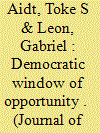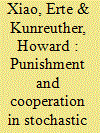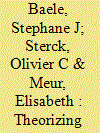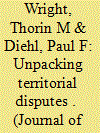|
|
|
Sort Order |
|
|
|
Items / Page
|
|
|
|
|
|
|
| Srl | Item |
| 1 |
ID:
145992


|
|
|
|
|
| Summary/Abstract |
Poor-quality data about conflict events can hinder humanitarian responses and bias academic research. There is increasing recognition of the role that new information technologies can play in producing more reliable data faster. We piloted a novel data-gathering system in the Democratic Republic of Congo in which villagers in a set of randomly selected communities report on events in real time via short message service. We first describe the data and assess its reliability. We then examine the usefulness of such “crowdseeded” data in two ways. First, we implement a downstream experiment on aid and conflict and find evidence that aid can lead to fewer conflict events. Second, we examine conflict diffusion in Eastern Congo and find evidence that key dynamics operate at very micro levels. Both applications highlight the benefit of collecting conflict data via cell phones in real time.
|
|
|
|
|
|
|
|
|
|
|
|
|
|
|
|
| 2 |
ID:
145990


|
|
|
|
|
| Summary/Abstract |
We show that drought-induced changes in the intensity of riots lead to moves toward democracy in sub-Saharan Africa and that these changes are often a result of concessions made as a result of the riots. This provides evidence that low-intensity conflict can have a substantial short-run impact on democratic change and supports the “window of opportunity” hypothesis: droughts lead to an increase in the threat of conflict, and incumbents often respond by making democratic concessions.
|
|
|
|
|
|
|
|
|
|
|
|
|
|
|
|
| 3 |
ID:
145986


|
|
|
|
|
| Summary/Abstract |
Military coups have posed a persistent threat to political stability in Africa, undermining democratization efforts, igniting insurgencies, and leading to years of devastating military governance. Initial cross-national studies found little consistent evidence linking ethnicity to coups, leading recent formal and statistical work on coup risk and coup-proofing to largely ignore ethnic politics. This article, however, argues that in two important contexts of African political development—decolonization and democratization—ethnic politics are critical to understanding the occurrence of coups. Both case study evidence and statistical analysis of original data on African military history and ethnic politics reveal that practices of ethnic manipulation within security institutions have driven coup attempts. When leaders attempt to build ethnic armies, or dismantle those created by their predecessors, they provoke violent resistance from military officers.
|
|
|
|
|
|
|
|
|
|
|
|
|
|
|
|
| 4 |
ID:
145989


|
|
|
|
|
| Summary/Abstract |
Previous findings on punishment have focused on deterministic environments in which the outcomes are known with certainty. In this article, we conduct experiments to investigate how punishment affects cooperation in stochastic social dilemmas where each person can decide whether to cooperate, when the outcomes of alternative strategies are specified probabilistically. Two types of punishment mechanisms are studied: (1) an unrestricted punishment mechanism—both persons can punish—and (2) a restricted punishment mechanism—only cooperators can punish noncooperators. We compare behavior in a two-person deterministic prisoner’s dilemma game (DPD) with a two-person stochastic prisoner’s dilemma (SPD). In all treatments, participants are given information on the other person’s actions. We find that in both games, the restricted punishment mechanism promotes more cooperative behavior than unrestricted punishment. However, the difference in the degree of effectiveness between the two mechanisms is smaller in the SPD game than in the DPD game because noncooperative behavior is less likely to be punished when there is outcome uncertainty. Our findings provide useful information for designing efficient incentive mechanisms to induce cooperation in a stochastic social dilemma environment.
|
|
|
|
|
|
|
|
|
|
|
|
|
|
|
|
| 5 |
ID:
145987


|
|
|
|
|
| Summary/Abstract |
This article seeks to understand the impact of religious diversity on religious tolerance in developing countries and draws lessons from the case of Nigeria. Religious diversity has appeared to prompt religious intolerance in Nigeria when we view the country from a distance. However, this article reveals important subnational variation. Using original survey data collected in 2006, I compare the impact of religious observance on respect for religious freedom across four settings within Nigeria and find religious observance was having, at the time of the survey, a more positive impact on respect for religious freedom in the most religiously diverse and integrated of the four settings. In-depth interviews indicate that Christian and Muslim religious leaders more openly encouraged religious tolerance in religiously diverse and integrated settings than in religiously homogenous settings. Substantively, this study suggests that religious segregation rather than religious diversity has inhibited religious tolerance in Nigeria and provides a baseline for assessing how changes in religious diversity and sociopolitical conditions across time affect the likelihood that Christianity and Islam are applied in ways that promote or impede tolerance. Methodologically, it reveals the importance of examining individual-level data and subnational variation when attempting to understand the political impact of religion in any country.
|
|
|
|
|
|
|
|
|
|
|
|
|
|
|
|
| 6 |
ID:
145991


|
|
|
|
|
| Summary/Abstract |
While recent research has demonstrated the key role played by emotion in conflicts, the interplay between the individual and collective dimensions of this variable has not yet been fully conceptualized and satisfyingly measured. Focusing on the 2011 Palestinian statehood bid at the United Nations and the United Nations Educational, Scientific and Cultural Organization, this article highlights the circular character of group-based emotional dynamics and stresses the importance of “emotional worldviews” and “emotional configurations.” We subsequently provide an innovative, robust, and repeatable quantitative method for the direct measuring of these two components. This threefold contribution—theoretical, methodological, empirical—completes recent models (chiefly the appraisal-based framework) and unfolds new research avenues for the study of the role of individual and collective emotions in conflicts.
|
|
|
|
|
|
|
|
|
|
|
|
|
|
|
|
| 7 |
ID:
145988


|
|
|
|
|
| Summary/Abstract |
What distinguishes the militarized territorial disputes that escalate to war from those that do not? Although research has clearly established that territorial conflicts are especially war-prone, the understanding as to why this is the case is less developed when compared to domestic factors such as joint democracy. We explain that territorial conflicts are especially war-prone when democratic and autocratic states are engaged in conflict against one another. Because of domestic concerns, democracies and autocracies value territory differently, generating a smaller bargaining space. Democracies will tend to be more resistant to settlement when territory is of a “public,” symbolic, or intangible value. Autocracies, on the other hand, are more likely to value the tangible qualities of territory, such as its resource value. This disparity in territorial goals makes mixed regime dyads more war-prone when territory is disputed. We further believe that the smaller the winning coalition in autocracies, the more war-prone they are against democracies. We test these propositions among all dyads as well as interstate rivals and find support for our theoretical framework.
|
|
|
|
|
|
|
|
|
|
|
|
|
|
|
|
|
|
|
|
|